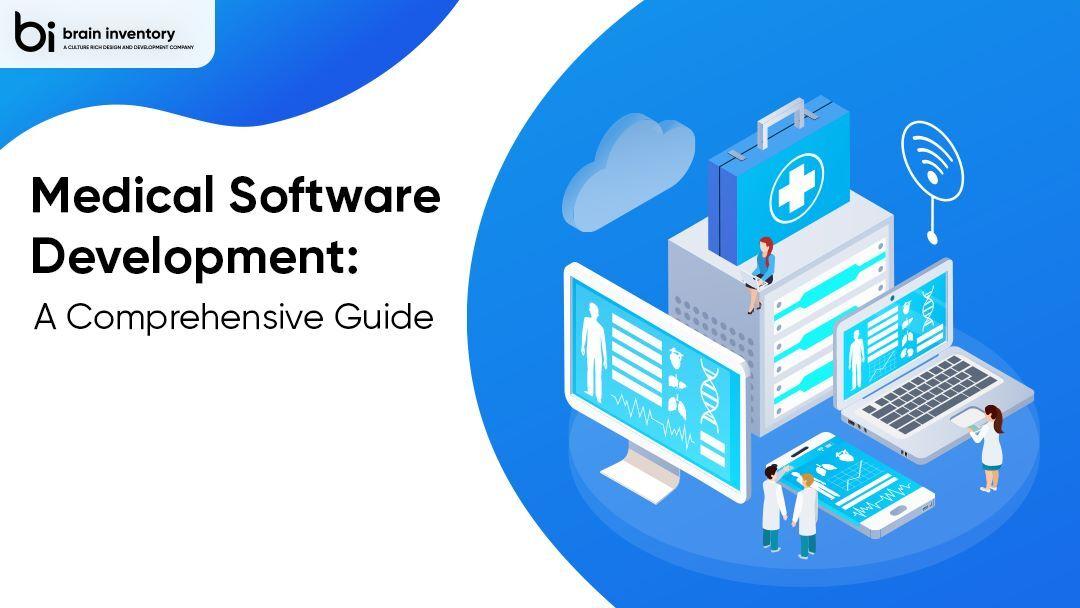Medical Software Development: A Comprehensive Guide

Quick Summary: The landscape of healthcare is undergoing a profound transformation with the integration of cutting-edge technologies. One pivotal aspect of this evolution is the development of medical software that enhances patient care, streamlines workflows, and fosters innovation within the healthcare industry. In this comprehensive guide, we will delve into the intricacies of medical software development, exploring its significance, challenges, and key considerations for creating robust solutions.
Understanding the Importance of Medical Software Development:
1. Enhancing Patient Care:
Medical Software plays a crucial role in improving patient care by facilitating efficient communication between healthcare providers, reducing errors, and enabling quick access to patient data. From Electronic Health Records (EHR) systems to telemedicine platforms, these solutions contribute to a more integrated and patient-centric healthcare experience.
2. Streamlining Workflows:
Medical software streamlines administrative and clinical workflows, allowing healthcare professionals to focus more on patient care. Appointment scheduling systems, billing software, and diagnostic tools contribute to the overall efficiency of healthcare organizations.
3. Enabling Data-Driven Decision-Making:
The integration of analytics and data visualization tools in medical software empowers healthcare providers to make informed decisions. Data-driven insights derived from patient data contribute to improved diagnostics, treatment plans, and overall healthcare management.
Key Considerations in Medical Software Development:
1. Regulatory Compliance:
Compliance with healthcare regulations, such as HIPAA in the United States, is non-negotiable. Developers must ensure that medical software adheres to these stringent standards to safeguard patient confidentiality and data security.
2. Interoperability:
Given the diverse ecosystem of healthcare systems, interoperability is a critical consideration. Medical software should seamlessly integrate with existing EHR systems, diagnostic equipment, and other healthcare technologies to facilitate cohesive data exchange.
3. User-Centric Design:
User experience is paramount in medical software development. Intuitive interfaces, simplified navigation, and accessibility features are essential to ensure that healthcare professionals can use the software effectively, contributing to better patient care.
4. Security Measures:
Protecting patient data from cyber threats is a top priority. Robust security measures, including encryption, secure authentication, and regular security audits, are imperative to prevent unauthorized access and data breaches.
5. Scalability and Flexibility:
Medical software should be designed to scale with the growing needs of healthcare organizations. It should also be flexible enough to accommodate technological advancements and evolving healthcare practices.
6. Integration of Emerging Technologies:
The integration of emerging technologies such as Artificial Intelligence (AI), Machine Learning (ML), and the Internet of Things (IoT) can significantly enhance the capabilities of medical software. These technologies can contribute to predictive analytics, personalized medicine, and remote patient monitoring.
Overcoming Challenges in Medical Software Development:
1. Data Privacy Concerns:
Addressing data privacy concerns is a persistent challenge. Developers must implement robust encryption, access controls, and data anonymization techniques to protect sensitive patient information.
2. Complex Regulatory Landscape:
Navigating the complex regulatory landscape of the healthcare industry requires meticulous planning and a thorough understanding of regional and international regulations. Collaboration with legal experts is often necessary to ensure compliance.
3. User Adoption:
Healthcare professionals may be resistant to adopting new technologies. To overcome this challenge, providing comprehensive training programs, soliciting feedback during development, and emphasizing the benefits of the software are crucial.
4. Integration with Legacy Systems:
Many healthcare organizations still rely on legacy systems. Ensuring seamless integration with these systems without disrupting existing workflows can be a complex undertaking.
5. Continuous Maintenance and Updates:
Medical software requires continuous maintenance to address bugs, and security vulnerabilities, and to ensure compatibility with evolving technologies. Regular updates are essential to keep the software current and effective.
Conclusion
The development of medical software is a multifaceted process that demands a meticulous approach. By prioritizing regulatory compliance, user experience, security, and the integration of emerging technologies, developers can contribute to the advancement of healthcare delivery. Overcoming challenges in this domain requires collaboration between developers, healthcare professionals, and regulatory bodies to create solutions that not only meet the needs of today but also pave the way for a more innovative and efficient healthcare future.
Brain Inventory is a customer-centric software development company that values your needs. We work with you through every step of the process to provide you with high-quality and customized mobile applications using our end-to-end mobile technology stack, which includes native apps for iOS, Android, Windows Phone, and tablets.

Have an idea?
Get in touch, we’d be
happy to hear from you
We are always looking out for new collaborations, whether you are a client who is passionate about a project or a talent who is interested in joining our team, our doors are always open.
locate us

India (HQ)
618, Shekhar Central, Palasia Square, A.B Road, Indore, Madhya Pradesh, 452001
+918109561401

United Kingdom
Brain Inventory, SBVS, 8 Roundhay Road, Leeds, UK, LS7 1AB
+18008209286

Canada
44 Main Street East Milton, ONCanada L9T 1N3
+4166696505

Jordan
185 Wasfi Al-Tal Street, Ammon Oasis Complex P.O Box 4724 Amman 11953 Jordan
+960770781000

USA
720 Seneca St Ste 107 Seattle, USA 98101
+1(206)6533419
if it's digital,we'll make it.
- Numetric - Online Accounting Software similar to QuickBooks
- Bloomia - Kegel exercise
- Virifi - Blockchain Powered Document Certification & Signing Platform
- Revolution Travel CRM - Custom CRM Built for Travel Agents
- Fatoura - Online Invoicing Platform
- My Fit Mantra - Your health partner
- Ocureel - Relation Building and video sharing Application